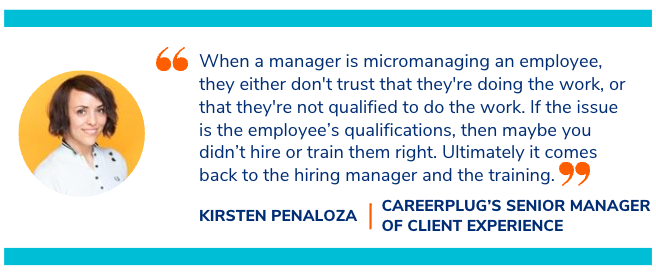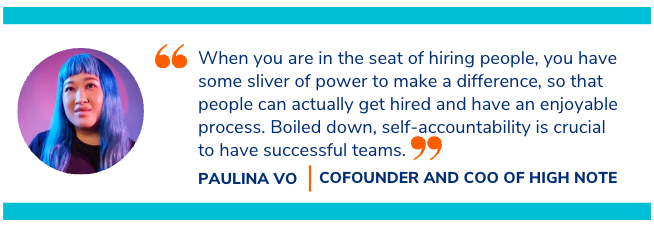We’ve seen a lot of change in the hiring space over the last few years. The pandemic caused mass layoffs and companies have struggled with over-hiring. According to the Bureau of Labor Statistics, total payroll employment increased by 253,000 in April 2023, and the unemployment rate edged down to 3.4 percent.
In simple terms, it is a job seeker’s market right now. Employers are certainly feeling this shift in the hiring landscape, and maybe even resenting it.
CareerPlug wants to make hiring easier, so we organized a webinar to help employers learn about common hiring myths and provide some insight into why hiring is so difficult right now. Plus, we’re sharing some advice for how to make it a little easier!
Full webinar video:
Hosted by: Kirsten Penaloza, CareerPlug’s Senior Manager of Client Experience
Panelists include:
- Jim Noone, Director of Employee and Labor Relations at the University of Denver
- RaeAnn Lovall, Chief People Officer at Home Base
- Paulina Vo, Co-founder and COO at High Note
Busting common hiring myths
Myth #1: Today’s job seekers only apply to keep their unemployment money
Many hiring managers have experienced people dropping out of their hiring process. This often leads them to believe that job seekers are only applying to open roles to keep receiving unemployment… but is this true? What’s really causing candidates to drop out or turn down offers for a job?
Jim Noone, Director of Employee Relations at the University of Denver, shares his thoughts, “I think this myth comes from people who are typically not responsive to their market and instead see themselves as doing job seekers a big favor by offering them a job. That’s just not realistic. If you’re not being competitive, it should not be a surprise that people are not chomping at the bit to get your job.”
Hiring managers are confronted with the additional hurdle of rising salary expectations. Millions of people quit their jobs in the last couple years, sparked by COVID-19 and a chance to reconsider their career expectations. Since 2021, there has been a sweeping demand for higher wages. It is important for hiring managers to offer a competitive salary and the right benefits. It is also key to include compensation in their job descriptions to attract candidates in the first place.
Candidate Ghosting
In our Candidate Experience Report, we asked job seekers why they decline job offers. CareerPlug’s data shows that 22% of candidates reject a job because they had a negative interview experience. Even further, 50% of candidates who ghost a company do so after the interview process. What is the root cause of this phenomenon?
This issue proves the increasing importance of the candidate experience. Paulina Vo, Cofounder and COO of High Note, shares that candidate ghosting is a problem she has experienced herself. She explains, “We obviously need to fill those roles as hiring managers, but the choice is ultimately in the hands of the job seeker.”
Myth #2: Job seekers should have academic credentials and perfect relevant experience
What really matters when it comes to hiring the right people?
All our panelists agreed that hiring for growth potential is one of the most important things hiring managers can do. RaeAnn Lovall, Chief People Officer of Home Base, shares her expertise: “We are looking for the person who will come in and say, ‘I can learn, I can problem solve, I can work with other people. Not only can I do that, I want to do that.’ That is the number one thing that we look for…it’s not a college degree.”

How to interview for growth potential
The interview process can be used as a tool to avoid common hiring mistakes and hiring biases.
Lovall shares some core questions she uses in her interviewing process to flesh out a candidate’s willingness to learn and grow: “In my interviewing it’s, ‘When have you attacked a challenge? What obstacles were in your way? How did you get support or not in that endeavor? How have you dealt with a disagreement with another employee?’ With these questions, you can learn how they’ve handled exhibiting that growth mindset.”
To help build diverse candidates, Vo asks the question “What are you passionate about?” in her interview process. She notes that this question gives her insight into a person who, on paper, might not look like they’re qualified for a specific role — but in fact are capable based on their life experiences.
This question also gives hiring managers a sneak peek into a candidate’s growth potential by allowing candidates to share how they function outside of a work environment. It gives candidates who may not have extensive experience an opportunity to prove their capabilities.
When it comes to hiring credentials, a candidate’s attitude and potential to grow are ultimately most important. Noone shares his mindset when hiring people with diverse experiences: “It need not be work experience. It can be volunteer experience. It can be an experience that they have in school with their family. I’m less interested in the experience being very specifically drawn to the job that I’m looking for, so much as assessing that there is that teachability.”

Myth #3: Employees want to work from home so they don’t have to work hard
The pandemic led to a dramatic spike in remote and hybrid work. And though this is no longer necessary for safety reasons, it’s still a preference for many employees. A common misconception is that employees who work from home are less productive than those in traditional work environments. CareerPlug’s panelists came ready to debunk this myth.
In reality, remote jobs provide a balance between work and personal life — employees can be flexible and productive in the comfort of their own homes. Our panelists agreed that this hiring myth stems from a lack of trust that leads to micromanaging employees.
Webinar host and CareerPlug’s Senior Manager of Client Experience, Kirsten Penaloza, reminds us that trust issues about working from home may point to a root problem of making the right hires. She shares, “When a manager is micromanaging an employee, they either don’t trust that they’re doing the work, or that they’re not qualified to do the work. If the issue is the employee’s qualifications, then maybe you didn’t hire or train them right. Ultimately it comes back to the hiring manager and the training.”

Attracting candidates for in-person jobs
Proactive approaches to hiring can be difficult, particularly in attracting candidates for jobs that lack remote or hybrid work arrangements, such as retail.
Noone and Vo agreed that a company’s culture comes into play in these instances. Noone explains, “What is your total employment value proposition? What are you bringing to the table as an employer? It’s not just a paycheck.”
Lovall makes the key point that for in-person roles, hiring good managers is very important. In any job, the relationship with a direct manager can create an environment of trust, security, and fun that motivates applicants to accept and retain roles.
Final advice for hiring managers
Our panelists were asked to share any final tips or advice they have for current hiring managers.
Lovall advises that companies should avoid hiring solely for culture fit. It is tempting to hire someone just because of a referral, since they probably have similar work ethic. But Lovall explains, “And yet, that is what creates that sameness and the lack of diversity… just because someone has been friends with [a candidate] forever doesn’t mean that they’re going to be the best fit.”
Vo shares the simple yet effective advice to stop ignoring hiring problems. She shares, “When you are in the seat of hiring people, you have some sliver of power to make a difference, so that people can actually get hired and have an enjoyable process. Boiled down, self-accountability is crucial to have successful teams.”

While the job market seems like a complicated place right now, employers should understand the importance of using open-minded hiring practices. It’s key to hire for growth potential and prioritize trust in order to build a promising workplace.
Ultimately, it is a job seeker’s market right now. Hiring managers should know that in the end, they are not just offering candidates a job, but an opportunity to be a part of their company and a future to grow.

Stay competitive in a job seeker’s market
Grow your team faster and better with CareerPlug. Automation tools streamline your most tedious hiring tasks, and candidate evaluation features can help you hire with confidence. Try it out for free today!
Get A Demo